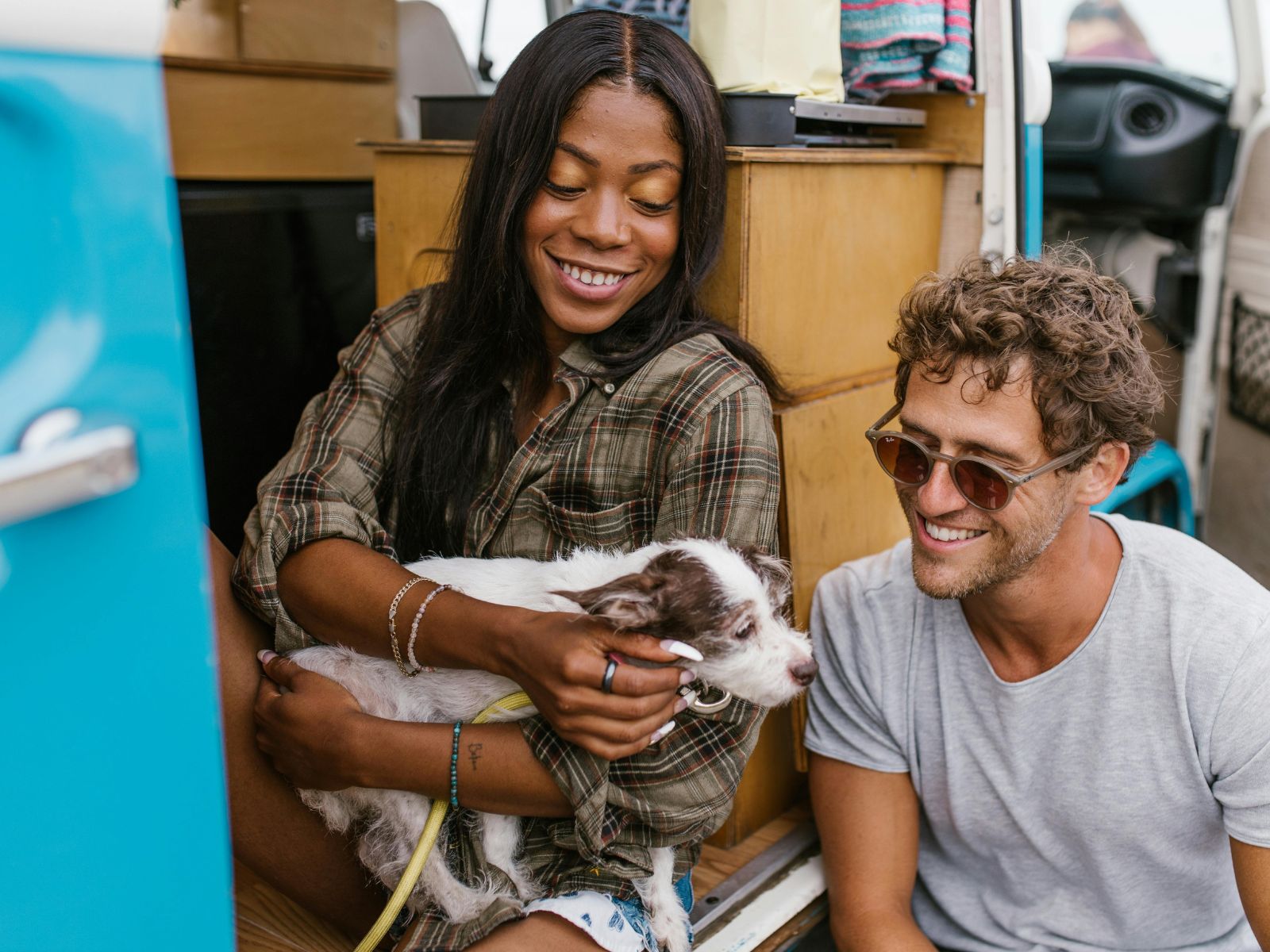When it comes to man’s best friend, many of us will want to take them with us on our travels, whether it’s on a road trip in a campervan or just to your local park for a run around in your work van. But is travelling with your dog in your van legal?
In this guide, we’ll look into the rules that are in place for having pets in your van.
Is it legal to travel with dogs in your van?
No need to worry, it is actually completely legal to travel with your dog (plus other domestic pets) in your van, as long as you follow the correct guidelines to keep you, and them, safe while driving.
The Highway Code states, “When in a vehicle make sure dogs or other animals are suitably restrained so they cannot distract you while you are driving or injure you, or themselves, if you stop quickly. A seat belt harness, pet carrier, dog cage or dog guard are ways of restraining animals in cars.”
The best ways to keep your dog secure in a van
Your pup being safe and secure is most likely one of your top priorities when you have them as a bonus passenger so, here are some tips to make sure they remain protected on your journey.
Carrier crate
A popular option for comfort and security, a carrier crate can be attached to your vehicle and then your pet can sit comfortably in it while you drive to your destination.
Travel crates typically come in two different types, metal or fabric, with metal ones typically coming in larger sizes and fabric ones (also known as pet carriers) coming with handy storage pockets and handles to help you get the crate in and out of the vehicle.
You can put some blankets and their favourite toys inside to keep them comfortable, plus, we recommend getting them used to the crate before trying it in your van. You could pop some treats in the crate to encourage them to use it in your home as a first step and go from there.
Seat belt harness
It isn’t ideal, but if the back of your van doesn’t have much room, you could put your pooch in the front with you. You can then use a pet seat belt that connects the seat to their harness. We recommend that you don’t attach it to their collar if the seat belt is shorter as this could be uncomfortable for them.
We also recommend that your pet isn’t sitting in the seat next to you as they could interfere with you safely driving your van or campervan. Make sure that if your passenger seat has an airbag, you put the seat as far back as possible to prevent them from getting hurt if you’re involved in an accident.
Pet car seats
These come in all shapes and sizes but can work well for cars, the front of vans or any available seat in a campervan. Many are like portable pet beds, adding comfort for smaller pets as they travel.
They attach to a seat and typically have a clip seat belt as a safety precaution. Similar to the seat belt, if it doesn’t come with one, we recommend attaching it to your dog’s harness instead of their collar.
Other ways to keep your dog safe in a van
So, your four-legged friend is secured in your van, but if you’re taking them on a longer journey, how else can you ensure that the journey is as pleasant as possible for them?
Luckily for you and your beloved pet, there are a few tips and tricks you can try:
Before you travel
Prepping your pet for a longer drive is important, especially if they’re not used to it. You can take them on very short journeys in your van to get them used to the process, and if they’re especially anxious, start with a journey as short as down the road and back.
If you’re able to, try to tire them out before a long car journey. A walk and lots of play will hopefully ensure that they sleep peacefully during your road trip together.
Toilet and water breaks
You will most likely make sure your pup goes to the toilet at both ends of your journey but it is important that they get a toilet break during the drive too as it isn’t good for them to hold it for too long (depending on their size).
Staying hydrated is also key to your pet’s wellbeing so, when you stop, make sure they have a chance to drink some water too. There are travel bowls and dog water bottles to make this easier for you to do while on the go.
Keep them calm
Car or van journeys can be a lot for a dog to cope with so keeping them comfortable and calm is key. An anxious dog may distract you from driving safely so it is best for everyone in the vehicle that your pooch remains happy.
If they’re correctly restrained and comfortable, it should just be a case of checking in on them from time to time but you can also play relaxing music or have someone sat in the back with them.
Watch the temperature
By now, every pet owner is aware that leaving your dog in any vehicle alone (even with a proper van lock) isn’t smart and particularly unsafe in hot weather. It could even get you in a lot of trouble under the Animal Welfare Act 2006. Dogs are sensitive to hot temperatures so open windows, aircon, water, and regular check-ins are important while they’re in your van.
Similarly, if it is cold out, keep blankets and even a hot water bottle (with a cover or wrapped up) to hand for your pup.
Van insurance that even your dog would approve of
You and your furry friend may be ready to hop in your van and go, but make sure it’s insured correctly before you do. At Adrian Flux, we’re here to help you find the right van insurance with ease.
For our best rates, call 0800 369 8590 or book a callback at a time that works for you.
Publisher: Source link











